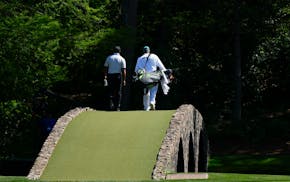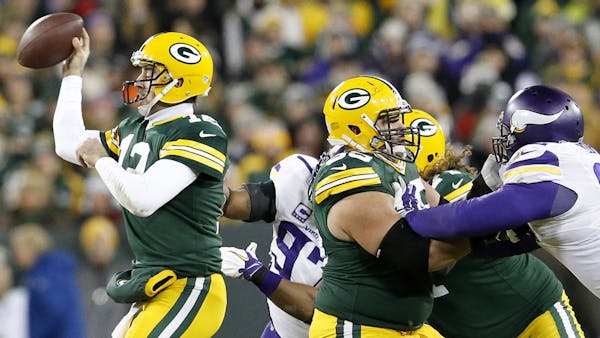Sunday night, millions of Vikings fans and dozens of Vikings players will ask what Sam Bradford can do for them.
Just as important is the reverse.
What can the Vikings do for Bradford?
The answer will shape this season, and the next, and so will Bradford's career, and perhaps his last chance to improve his reputation.
Bradford was the first pick in the 2010 draft. Which means he was selected by a terrible team.
Bradford did not singlehandedly elevate the Rams. Neither has anyone else. They haven't had a winning record since 2003.
Bradford muddled through, putting up numbers not all that different from Teddy Bridgewater's, for four seasons before being traded to Philadelphia.
Last year with the Eagles, while adapting to a new and complex offense, Bradford completed 65 percent of his passes, throwing 19 touchdowns and 14 interceptions for an 86.4 passer rating.
Last year, in his second season with the Vikings, Bridgewater completed 65 percent of his passes, throwing 14 touchdowns and nine interceptions for a rating of 88.7.
Bradford is on his third team and was asked to be a savior, so his numbers are considered disappointing. Bridgewater is younger and thought to be improving, so his very similar numbers are considered promising.
The question facing Bradford is whether, at 28, he is still a growth stock. While there is no sure way to predict his future, this is a good time to point out that even great quarterbacks need help, and that Bradford never has played for a winning team, or with a running back like Adrian Peterson.
Two years from now, Bradford will either have proved he can lead a winning team, or he will be on his way to Ponder-osa.
"He's very talented, very physically talented," Vikings quarterback Shaun Hill said when asked how Bradford fits into the offense. "And I knew he'd be a good fit for this offense as soon as I heard we were trading for him. I was like, 'OK, yeah, that makes sense.'
"He'll be good in this offense."
If he is, Bradford will join an impressive list of QBs who excelled after leaving their original teams.
Brett Favre was drafted by the Falcons. Kurt Warner started his career as an undrafted free agent with the Packers. Rich Gannon managed a solid stint with the Vikings before going on to become a star with Oakland. Drew Brees was underappreciated in San Diego and has become a Hall of Fame- caliber passer in New Orleans.
Around the NFL, Alex Smith, Ryan Fitzpatrick, Tyrod Taylor, Brock Osweiler, Jay Cutler, Brees, Blaine Gabbert, Carson Palmer and Case Keenum are starters who started their careers with other teams. It wouldn't be surprising to see five of them in the playoffs and one or two of them (Brees and perhaps Palmer) as MVP candidates if their teams win.
Quarterbacks are asked to elevate their teams, but it's often teams that elevate quarterbacks. Favre might have become an outstanding quarterback if Ron Wolf hadn't traded for him and Mike Holmgren hadn't tutored him, but how many strong-armed, athletic quarterbacks have flamed out in the NFL while playing for lesser teams and coaches?
The latest edition of the spectacle that is the Vikings-Packers rivalry will play out tonight in a stunning billion-dollar stadium. The home team will trot out a first-time starter at quarterback, because no Vikings-Packers game can ever occur without an undercurrent of unexpected drama.
Millions will watch to see what Sam Bradford can do for the Vikings, but the team has to make the quarterback better, too.
Bradford never has played in a playoff game. The Vikings haven't won one since 2009. Both can use a little help.
Jim Souhan's podcast can be heard at MalePatternPodcasts.com. On Twitter: @SouhanStrib. • jsouhan@startribune.com

Souhan: This is KAT's chance to prove Flip Saunders was right

Souhan: Why Tiger Woods should keep swinging
Souhan: Scheffler wins Masters again, shows what makes him special
Morikawa falters in final round at Masters


